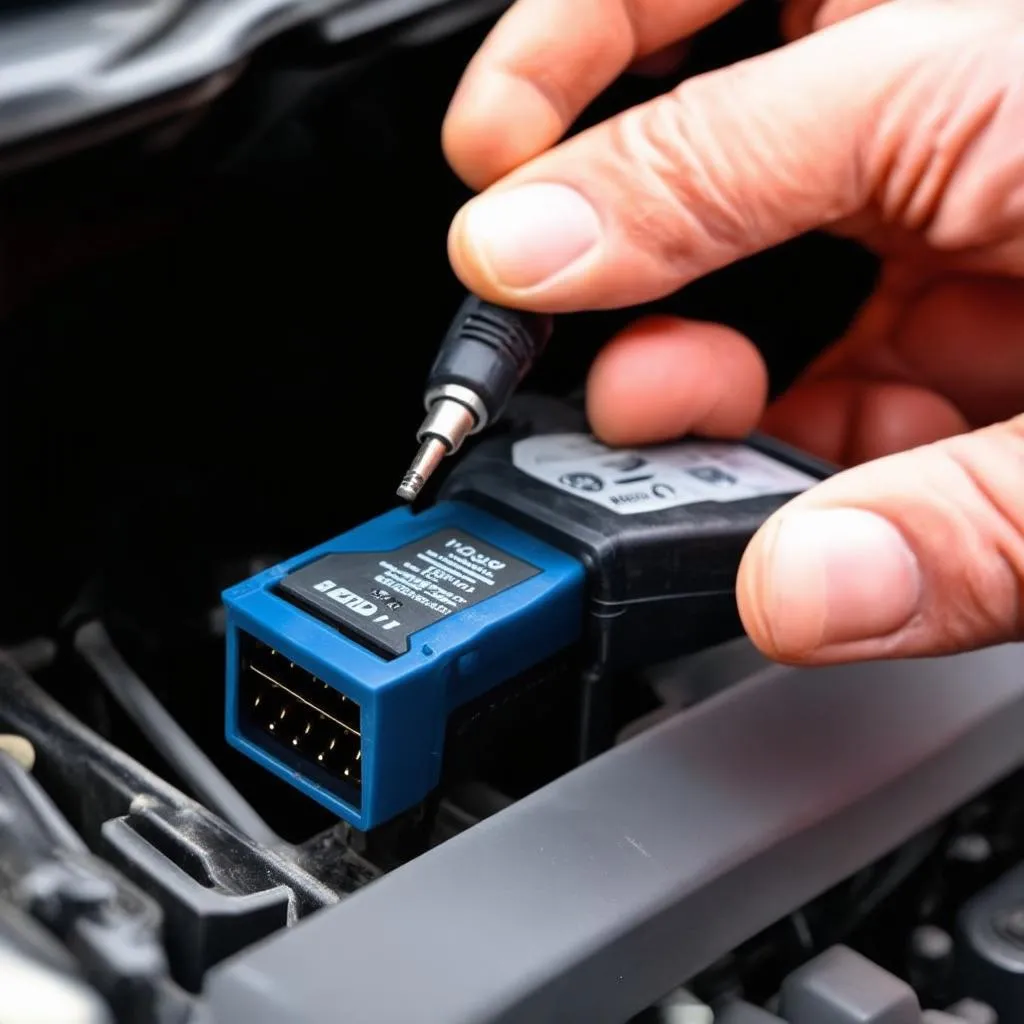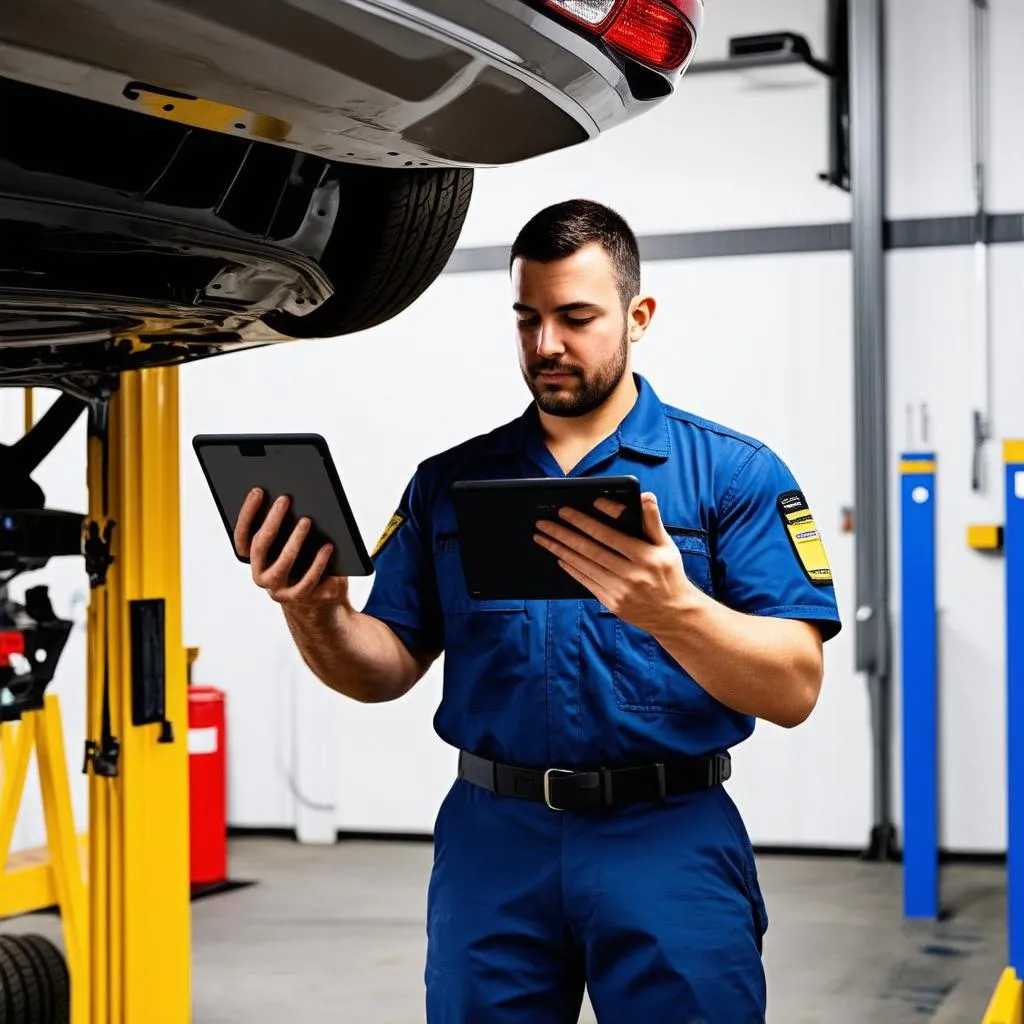Imagine this: You’re cruising down the highway, enjoying the open road, when suddenly your car loses power steering. Your dashboard lights up like a Christmas tree, and the dreaded “Check Engine” light stares back at you. You pull over, heart pounding, wondering what could be wrong. A quick scan with your trusty OBD-II reader reveals the cryptic message: “U0121 code detected.” What does it mean? Is your car about to fall apart?
Don’t panic! In this article, we’ll delve into the depths of the U0121 OBD-II code, decipher its meaning, and guide you towards a solution. We’ll explore the potential causes, symptoms, and repair options, empowering you to tackle this automotive puzzle with confidence.
What Does the U0121 Code Mean?
The U0121 code falls under the category of network communication codes, specifically indicating a “Lost Communication with Anti-Lock Brake System (ABS) Control Module.” In simpler terms, it means your car’s engine control unit (ECU) is unable to “talk” to the ABS module.
Think of it like this: your ECU is the captain of your car’s nervous system, while the ABS module is responsible for preventing your wheels from locking up during braking. When these two components can’t communicate, it’s like the captain giving orders that the crew can’t hear, potentially leading to a chaotic situation.
Why is the U0121 Code Important?
Your car’s ABS system plays a vital role in ensuring your safety on the road. When the ECU and ABS module can’t communicate, several safety features may be compromised, including:
- Anti-lock Braking System (ABS): As mentioned earlier, the ABS prevents wheel lock-up, allowing you to maintain steering control during hard braking.
- Electronic Stability Control (ESC): This system helps you maintain control of your vehicle during slippery conditions by selectively applying brakes to individual wheels.
- Traction Control System (TCS): This system prevents wheelspin during acceleration, ensuring optimal traction and stability.
A loss of communication between the ECU and ABS module can disrupt these safety systems, putting you and your passengers at risk.
Common Causes of the U0121 Code
The U0121 code can be triggered by a variety of factors, ranging from simple electrical glitches to more complex wiring issues. Some common culprits include:
- Loose or corroded wiring/connectors: Over time, the wiring and connectors in your car’s electrical system can become loose, corroded, or damaged, disrupting the flow of information between the ECU and ABS module.
- Faulty ABS module: Like any other electronic component, the ABS module itself can malfunction due to age, wear and tear, or exposure to extreme temperatures.
- Blown fuse or faulty relay: A blown fuse or faulty relay in the ABS system’s electrical circuit can interrupt the power supply, causing communication problems.
- Damaged CAN bus wiring: The Controller Area Network (CAN bus) is a communication network that allows various modules in your car to talk to each other. Damage to the CAN bus wiring can disrupt communication between the ECU and ABS module.
Symptoms of a U0121 Code
Aside from the illuminated “Check Engine” light, you may experience other symptoms if your car is throwing a U0121 code. These symptoms can vary depending on the make and model of your vehicle but may include:
- Loss of ABS functionality: You may notice that your brakes lock up during hard braking, indicating that the ABS system is not functioning correctly.
- Illuminated ABS warning light: In many cases, the ABS warning light on your dashboard will illuminate alongside the “Check Engine” light.
- Erratic speedometer or odometer readings: As the ABS system often provides speed information to the instrument cluster, communication problems can lead to inaccurate speedometer or odometer readings.
- Problems with other safety systems: As mentioned earlier, a U0121 code can also affect other safety systems that rely on communication with the ABS module, such as ESC and TCS.
Diagnosing and Fixing the U0121 Code
While this article provides a general overview of the U0121 code, it’s important to remember that diagnosing and repairing automotive electrical problems can be complex and potentially dangerous. If you’re not comfortable working on your car’s electrical system, it’s always best to consult with a qualified mechanic.
However, if you’re a seasoned DIY mechanic, here’s a general approach to diagnosing and fixing the U0121 code:
- Read the code: Start by connecting an OBD-II scanner to your car’s diagnostic port and reading the stored codes. Note down any other codes present, as they may provide additional clues.
- Inspect the wiring and connectors: Carefully examine the wiring and connectors associated with the ABS system, looking for any signs of looseness, corrosion, or damage.
- Check the fuses and relays: Consult your car’s owner’s manual to locate the fuse box and identify the fuse and relay related to the ABS system. Test them for continuity using a multimeter or replace them if necessary.
- Inspect the CAN bus wiring: Check the CAN bus wiring for any signs of damage, such as cuts, chafing, or shorts. Repair or replace any damaged wiring as needed.
- Test or replace the ABS module: If all other components check out, the ABS module itself may be faulty. In this case, you can either test the module using specialized equipment or replace it with a new one.
 car diagnostic port
car diagnostic port
Frequently Asked Questions about the U0121 Code
Q: Can I still drive my car with a U0121 code?
While you may be able to drive your car for a short distance with a U0121 code, it’s not recommended. As the ABS system and other safety features may be compromised, driving with this code present increases the risk of an accident.
Q: How much does it cost to fix a U0121 code?
The cost of repairing a U0121 code can vary widely depending on the underlying cause, the make and model of your vehicle, and labor rates in your area. Simple fixes, such as replacing a fuse or repairing a loose connection, may only cost a few dollars in parts. However, more complex repairs, such as replacing the ABS module, can cost several hundred dollars or more.
Q: Can I fix the U0121 code myself?
If you have experience working on car electrical systems and are comfortable using a multimeter and other diagnostic tools, you may be able to fix the U0121 code yourself. However, if you’re unsure about any step of the process, it’s always best to err on the side of caution and consult with a qualified mechanic.
Other OBD-II Codes Related to ABS Systems
While the U0121 code specifically refers to a communication issue with the ABS module, several other OBD-II codes can indicate problems with your car’s ABS system. Some of these codes include:
- U0100: Lost Communication with ECM/PCM
- U0122: Lost Communication with Vehicle Speed Sensor
- C1233: ABS Control Module Internal Failure
- C1241: Low Hydraulic Pump Motor Voltage
Car Brands Supported by Techcarusa.com for U0121 Code Diagnostics
At Techcarusa.com, we offer comprehensive diagnostic and repair support for a wide range of car brands, including:
- European Cars: Audi, BMW, Mercedes-Benz, Volkswagen, Porsche, Volvo
- American Cars: Ford, Chevrolet, Dodge, Jeep, Chrysler
- Asian Cars: Toyota, Honda, Nissan, Hyundai, Kia
Our team of expert mechanics utilizes advanced diagnostic tools and software to accurately diagnose and repair any issues related to the U0121 code or other ABS-related problems.
 mechanic checking car
mechanic checking car
Need Further Assistance? Contact Techcarusa.com!
We understand that dealing with car troubles can be stressful. If you’re facing a U0121 code or any other automotive issue, don’t hesitate to reach out to the experts at Techcarusa.com.
Contact us via WhatsApp at +84767531508 for 24/7 support from our team of experienced automotive technicians. We’re here to help you get back on the road safely and quickly.
Explore More Automotive Insights on Techcarusa.com
For more informative articles on car maintenance, repair tips, and insightful guides on various automotive topics, be sure to explore our website, Techcarusa.com.
We encourage you to leave a comment below if you found this article helpful or have any questions. Share your experiences, insights, and automotive wisdom with our community of car enthusiasts.
